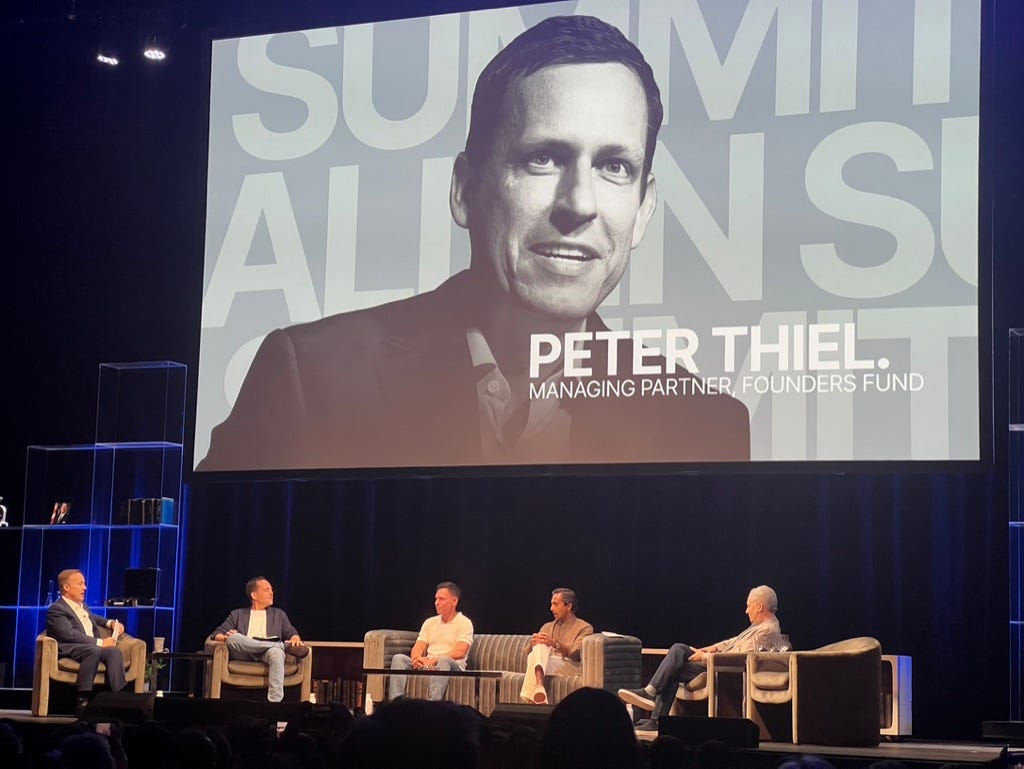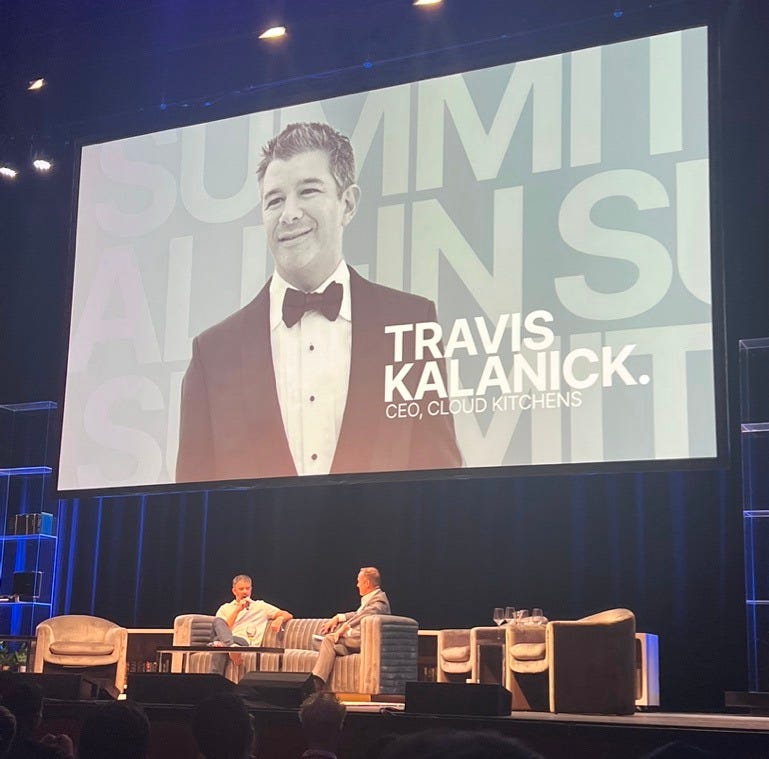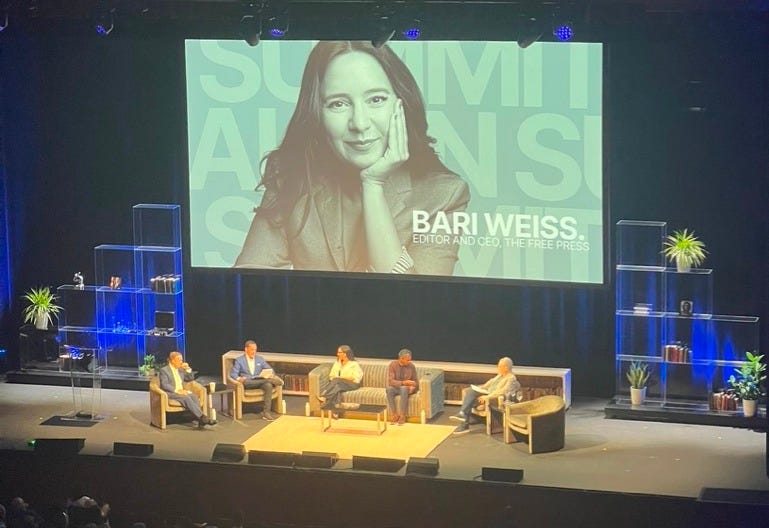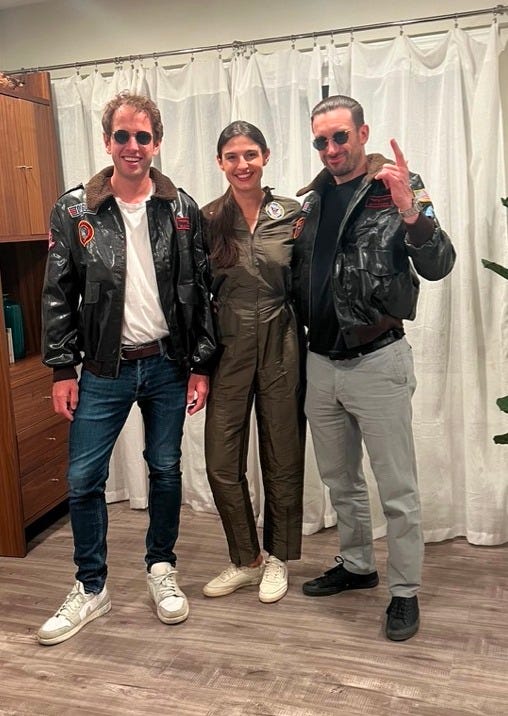All-In Summit: Is It Worth the Trip?
Hot Takes, Big Names, and My Poker Win.
The All-In Summit is organized by four investor friends—David Friedberg, Jason Calacanis, Chamath Palihapitiya, and David Sacks—who run the All-In Podcast. Their weekly discussions on current events, market trends, politics, and tech insights have attracted over 600K YouTube subscribers. As a loyal listener and poker enthusiast myself, I’ve followed the podcast for almost three years.
The event lasted three days in Los Angeles, with around 2,000 attendees by my estimate. The first day was all about networking, followed by two days of discussions with amazing speakers. The lineup, which wasn’t revealed until one day before the event, was incredible. Just to name a few: Elon Musk (Tesla, SpaceX), Peter Thiel (PayPal, Palantir), Travis Kalanick (Uber), Marc Benioff (Salesforce), Sergey Brin (Google), JD Vance (politician), and many more.
So, how was it? First of all, it was hot. Insanely hot, actually. The first two days were over 40 degrees. I’m not a big fan of a sauna—especially in the summer in LA.
Jokes aside, this felt like an event where people came because they truly wanted to, not because their employers sent them. Everyone I talked to was a fan of the podcast. So, most attendees already knew the besties, their style, opinions, and political/economic viewpoints. The interviews—most of which featured the four besties with a guest—felt natural, fun, and direct because of this shared context.
The interviews felt natural and direct, as if you were listening to a private conversation between friends rather than a formal event. The openness, jokes, and honest disagreements made the sessions fly by, even though they lasted for hours.
For example, Jason and Musk during the interview, had a hilarious conversation about checking if the show Saturday Night Live is truly live. Musk, once on the air, was supposed to reach into his pants and tell the audience he was going to show them his "cock"—AND then reveal a tiny rooster. The whole point was to see if viewers at home would actually see the rooster. If they did, it would prove the show - Saturday Night Live - was live; if not, it meant there was a delay in the broadcast. Not a typical conversation you hold in front of a large crowd.
Additionally, many speakers answered questions in a super direct way. For example, Thiel showed strong support for Trump in the upcoming election, highlighting that even if Trump wins, it may still lead to disappointment. Musk shared that his outspoken views could potentially lead to his arrest for political reasons.
Another aspect people enjoy about the podcast is the disagreements between the besties, which often lead to discussions and push others to think more deeply. The primary line of disagreement happens between Sacks, a strong Republican, and JCal, who claims to be independent but leans more toward the Democrats. Since it's an election year, many discussions, both in recent podcasts and during the conference, were related to politics.
A common sentiment among attendees was that there was too much political content, with many missing the older discussions that focused more on the economy, markets, and tech. With the election around the corner, it's likely that politics will continue to dominate the conversation. To keep things more engaging, it would be great to include more discussions with leaders or supporters from the Democratic side to keep the conversation more intellectually honest.
My top 3 interviews were the ones with Peter Thiel, Travis Kalanick, and Bari Weiss—with no particular order.
Thiel made a point about elections, explaining that voters often pick the lesser of two evils. He said that elections are a relative choice, where people vote more to oppose someone than to support another. But once someone becomes president, they are judged in absolute terms, which often leads to disappointment or regret. In most cases, no one is truly pro any candidate; it’s mostly about voting against the other. This highlights a broader frustration with modern elections.
On a funny note, he stated that investing in Europe “is always sort of junk” but “it’s a great place to go for holidays as an investor.”
Thiel also compared AI today to the internet in the late 1990s. It’s huge and will be incredibly important, but the real transformation will take time—20 years, not 6 months. Right now, predicting which AI companies will dominate is tough. Nvidia is the only one really making money, while others are still losing. It’s similar to how people didn’t know which internet companies would win in the early days, but we can be sure AI will reshape the world.
The part which stuck in my mind the most was his reply to JCal's question: “Are you optimistic for the future?"
Thiel: “I always push back on that question. I think extreme optimism and extreme pessimism are both really bad attitudes, and they're somehow the same thing. You know, extreme pessimism—nothing you can do; extreme optimism—the future will take care of itself. So, if you have to have one, it's probably best to be somewhere in between—maybe mildly optimistic, mildly pessimistic. But, uh, you know, I believe in human agency, and that it's up to us. It’s not, you know, winning a lottery ticket or some astrological chart that's going to decide things. I believe in human agency, and that’s an axis that's very different from optimism or pessimism. Extreme optimism, extreme pessimism—they’re both excuses for laziness.”
Kalanick shared a story of JD’s acquisition of Uber in China During the negotiations with JD, Uber made sure to apply a lot of pressure. They knew that in order to close the deal on food terms, JD had to be scared. As Kalanick explained, "We had to make them nervous." To achieve this, Uber ramped up its spending to a whopping $75 million a week. It was a move to create urgency and leverage it in negotiations. In the end, it worked. By driving up Uber’s market share in China and showing they were willing to burn cash, JD felt the heat, and Uber secured a deal where they retained 20% of the merged entity.
Reflecting on his time with Uber, Kalanick said, "I loved every minute." But now, his focus has shifted. "When you fall in love again, you don’t think about your ex that much,"
I also love his motivation for building things:
"A lot of folks go, ‘Look, you did the Uber thing, why are you doing it again? I mean, you cashed in a lot of chips, you could be just chilling.’ I'm like, ‘Look, Serena keeps getting on the court, she's totally badass, why is she doing it, right? You know, or take your favorite star of anything (...) It’s because they have a love of the game, and it's not just showtime that day. It's everything behind the scenes, it's working with people(...) You gotta—I like the magic of working with magical people. Doing it as a crew is where all the good stuff happens."
The interview I enjoyed the most was with Bari Weiss, who used to be an editor at The New York Times before she resigned. She then started a blog called Common Sense, which eventually became The Free Press media company.
Weiss talked about the transformation of journalism - how the role of journalists has shifted from reporting facts to pushing a specific political agenda. She emphasizes that journalism has become less about telling the plain truth and more about guiding people towards a "correct" political position, which she sees as a fundamental change in the job.
Weiss also talked about the confusion in society. She said, "people all of a sudden turned around and thought, when did everything get so insane?" Many people feel frustrated with today’s public conversations, where extreme opinions seem to dominate and common sense is hard to find.
Her goal with The Free Press is to combine the fact-checking standards that outlets like The Washington Post or The New York Times used to follow with the political freedom of independent media. She believes that truth, transparency, and making corrections when necessary are key to building trust with the audience.
The interview was fantastic, and after hearing her, I immediately became a subscriber to The Free Press.
The conference also hosted a poker tournament with a few hundred participants, which was a great way to meet others. The main prize was an invitation to a poker event in Las Vegas with the besties, and I'm thrilled to have been one of the 10 winners!
To sum up, there’s a good question to ask: Is it worth traveling to LA, paying a lot for the ticket to attend the conference in person, or is it better to just watch all the content on YouTube a few days later?
Here’s how I see it: Imagine you're a fan of Thai food. You could order Pad Thai from your favorite local restaurant on Uber Eats and enjoy it at home. Or you could fly to Thailand and buy Pad Thai on the streets of Bangkok, late at night when the streets are full of people. The smell of street food is everywhere, and you can see the fire as they fry the noodles. You feel the heat, you hear the sounds of the busy street—it’s an experience that touches all your senses. The taste of the food might be similar to what you get at home, but the overall experience is completely different and much more real.
Going to the conference is the same. You have to decide for yourself: Do you want to enjoy Pad Thai on your couch at home, or do you want the full experience of flying to Thailand? It’s a personal choice.
PS
Our crew getting ready to Top Gun party:






